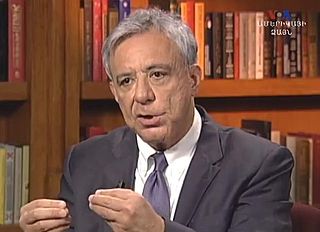
The University for Peace (UPEACE) is an intergovernmental organization with university status, established by treaty at the United Nations General Assembly in 1980 and having its main campus in Costa Rica. Its stated mission is "to provide humanity with an international institution of higher education for peace with the aim of promoting among all human beings the spirit of understanding, tolerance and peaceful coexistence, to stimulate cooperation among peoples and to help lessen obstacles and threats to world peace and progress, in keeping with the noble aspirations proclaimed in the Charter of the United Nations."
A think tank, or policy institute, is a research institute that performs research and advocacy concerning topics such as social policy, political strategy, economics, military, technology, and culture. Most think tanks are non-governmental organizations, but some are semi-autonomous agencies within government or are associated with particular political parties or businesses. Think-tank funding often includes a combination of millionaire donations and individual contributions, with many also accepting government grants.

The Revolution of Roses, often translated into English as the Rose Revolution, was a change of power in Georgia in November 2003. The revolution was brought about by widespread protests over the disputed parliamentary elections and culminated in the ousting of President Eduard Shevardnadze, which marked the end of the Soviet era of leadership in the country. The event derives its name from the climactic moment, when demonstrators led by Mikheil Saakashvili stormed the Parliament session with red roses in hand.
The Heinrich Böll Foundation is a German, legally independent political foundation. Affiliated with the German Green Party, it was founded in 1997 when three predecessors merged. The foundation was named after German writer Heinrich Böll (1917–1985).

Vartan Oskanian is the former Foreign Minister of Armenia (1998–2008) and founder of the Civilitas Foundation.
Partners for Democratic Change International (PDCI) is a global partnership of Partners for Democratic Change (Partners) and the nineteen independent, local organizations Partners founded in Europe, the Americas, the Middle East, and Africa that work to advance civil society, good governance and a culture of change and conflict management worldwide.
The Foundation for Tolerance International is a Kyrgyz non-governmental organization (NGO) founded in 1998 to prevent conflict and build peace and justice in Central Asia. It has operated for nine years in a fluid and changing context, but it has remained focused on its original goals of conflict prevention on a range of vertical and horizontal conflicts. FTI’s work is focused on two main directions:
Politics is the process by which groups of people make decisions. Although the term is generally applied to behavior within civil governments, politics is observed in all human group interactions, including corporate, academic, and religious institutions. Politics consists of "social relations involving authority or power. The definition of "politics" from "The Free Dictionary" is the study of political behavior and examines the acquisition and application of power. Politics study include political philosophy, which seeks a rationale for politics and an ethic of public behavior, and public administration, which examines the practices of governance.
Tharwa Foundation is a nonprofit, nonpartisan grassroots organization that encourages diversity, development and democracy in Syria and the broader Middle East/North Africa. The Foundation derives its name from the Arabic word, tharwa. Founded in 2003, the Tharwa Foundation is an offshoot of the Tharwa Project, an initiative launched in Damascus Syria by Ammar Abdulhamid and Khawla Yusuf. Abdulhamid is a blogger, human rights activist and author. Yusuf is an author, politician, and human rights activist.
The main ethnic minorities in Georgia are Azerbaijanis, Armenians, Ukrainians, Russians, Greeks, Abkhazians, Ossetians, Kists, Assyrians and Yazidi.
The Electoral Institute for Sustainable Democracy in Africa, or EISA, is an organization founded in 1996 in Johannesburg to "promote credible elections, participatory democracy, human rights culture and the strengthening of governance institutions for the consolidation of democracy in Africa."
The International Centre for Policy Studies (ICPS) is an independent NGO, founded in 1994 which aims to promote public policy concepts and practice and apply them to influential policy research that affects both the public and private sectors in Ukraine.

The Caucasus Institute is a think tank and postgraduate institution. Its focus is on encouraging pluralistic discourse in the South Caucasus, including the countries of Armenia, Azerbaijan, and Georgia. Its goal is to promote inclusive policy-making in Armenia through conducting research, producing and advocating policy documents and encouraging a pluralistic and informed public policy debate.

Georgian Dream – Democratic Georgia is the governing party of Georgia. The party was established on 19 April 2012 by the billionaire businessman and politician Bidzina Ivanishvili. It was the leading party of the six-party Georgian Dream political coalition which won the 2012 parliamentary election.

Janusz Bugajski is a Senior Fellow at the Jamestown Foundation in Washington DC and host of “Bugajski Hour” television shows broadcast in the Balkans. He was formerly a Senior Fellow at the Center for European Policy Analysis (CEPA) in Washington DC and the Director of New European Democracy Program at the Center for Strategic and International Studies (CSIS).
The Partnership for Peace Consortium is a network of over 800 defense academies and security studies institutes across 60 countries. Founded in 1998 during the NATO Summit, the PfPC was chartered to promote defense institution building and foster regional stability through multinational education and research, which the PfPC accomplishes via a network of educators and researchers. It is based at the George C. Marshall European Center for Security Studies in Garmisch, Germany. According to the PfPC Annual Report of 2012, in 2012 eight hundred defense academies and security studies institutes in 59 countries worked with the PfPC in 69 defense education/defense institution building and policy-relevant events. The Consortium publishes an academic quarterly journal CONNECTIONS in English and Russian. The journal is run by an international Editorial Board of experts and is distributed to over 1,000 institutions in 54 countries.

George Khutsishvili Doctor of Philosophy, Professor, was a prominent Georgian public figure, one of the founders of conflictology in Georgia and the Caucasian region and a scientist in the field of peace and conflict studies. In 1994 he founded the independent non-for-profit and non-partisan International Center on Conflict and Negotiation (ICCN). Between 1995 and 2013 he was the publisher of Peace Times, Conflicts and Negotiations and Alternatives to Conflict’ amongst others. For many years he was invited to work as a professor at different leading universities in Georgia and abroad. George Khutsishvili made significant input into study of the essence of theoretical thinking and the problem of the infinite in the light of philosophy and mathematics (1970-80s). From the 1990s to the end of his days he dedicated his life to establishing and developing peace and conflict studies in Georgia.
The Institute for Democratic Alternatives in South Africa (IDASA) later known as the Institute for Democracy in South Africa was a South African-based think-tank organisation that was formed in 1986 by Frederik van Zyl Slabbert and Alex Boraine. Its initial focus from 1987 was creating an environment for white South Africans to talk to the banned liberation movement in-exile, the African National Congress (ANC) prior to its unbanning in 1990 by the President F. W. de Klerk. After the South African election in 1994, its focus was on ensuing the establishment of democratic institutions in the country, political transparency and good governance. Caught up in a funding crisis after the 2008 global financial crisis, closed in 2013.

Europe-Georgia Institute (EGI) – is a non-governmental organization in Georgia. The Europe-Georgia Institute was founded by George Melashvili, Shalva Chkheidze and Revaz Topuria in 2015.

OC Media is an independent online news platform covering news from the North and South Caucasus regions.








